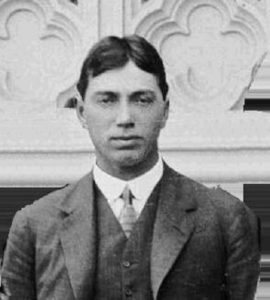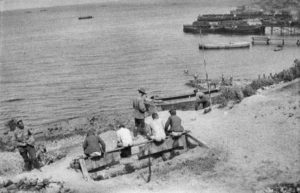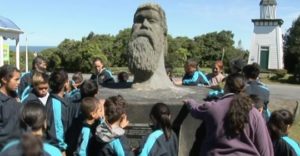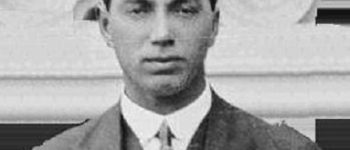1906: The Maori Communistic System
December 24, 2020
By AHNZ
 In October 1905 a young Dr Peter Buck was appointed as a Native Health Officer in the Liberal Government’s Department of Public Health. He was responsible for a vast patch of territory around Taranaki and Wanganui.
In October 1905 a young Dr Peter Buck was appointed as a Native Health Officer in the Liberal Government’s Department of Public Health. He was responsible for a vast patch of territory around Taranaki and Wanganui.
The Department wanted the young graduate for his intelligence and specialist knowledge but also because he was a relatable figure to Maoris. Buck, aka Te Rangi Hiora, was half-Maori himself and was raised to know their ways. Being assigned to help out the various Maori Councils in their quest to make their citizens healthy was Buck’s first big job in a long and famous career.
Buck’s Report
Going somewhat off-profile in the 1906 Departmental Report, Buck’s contribution covered health but also what he saw as root causes: Maori Communism. He writes…
“I have always endeavoured to work in conjunction with the Maori Councils, but it is very difficult in many cases to get as much assistance from them as one would desire owing to their not fully realising the amount of power conferred upon them by the Act.”
Maori Councils were a 10 year social experiment at best, or a pretend one at worst. The politicians used them to dull the masses while operators such as Apirana Ngata and Buck naively thought they could lead a horse to water and make him drink…by lecturing..
“In my lectures I have made them realise their duties as local governing bodies…The Maoris are at last beginning to learn that they have been intrusted with no mere toy with which to play at home-rule, but with something real in helping towards improving the condition of the people.”
In the 1960s, even in Maori culture today, educated and outgoing young men are relegated by their elders to dishes duty simply because they lack the seniority of age. Yet, the half-caste young Buck says the many Karmatua of four or more Districts are taking cues from him with no push-back. Truly?
“The routine method of procedure at meetings, strict attention to business, and the value of time and quick action are too far advanced for the ceremonial verbose style of many of the middle-aged Councillors, who are still only a generation removed from the New Stone Age I would suggest that Health Officers be made members of the Council whose districts they visit.”
Wait…what’s the matter, Peter? Why do you need to be appointed a Council Member if the verbose middle-aged men are heeding your lectures?
Another young university graduate, Apirana Ngata, was buzzing around the Maori Councils tutoring these Councillors in how to hold efficient meetings. Sounds like his success was less than absolute.
“Wanganui Council District …We have been educating these Committees in their duties, and they are now beginning to share the burden of sanitary improvement.”
Now beginning? Wanganui Council District is one of the oldest, est. c.1901 yet it’s only now beginning to do its one main job? Bad progress by 1906 in a social experiment that’s about to fizz out.
 “Water-closets are ceasing to be objects of aversion. Their use had been forgotten since peace drew the Maori down from the fighting-pas where the paepae was never absent; and very little argument suffices to prove that they are no startling innovation of the white man, but an old friend under a new guise….Even the sanitary laws of the old fighting-pas are lost, so that the reintroduction of some of them is regarded as a foreign innovation. “
“Water-closets are ceasing to be objects of aversion. Their use had been forgotten since peace drew the Maori down from the fighting-pas where the paepae was never absent; and very little argument suffices to prove that they are no startling innovation of the white man, but an old friend under a new guise….Even the sanitary laws of the old fighting-pas are lost, so that the reintroduction of some of them is regarded as a foreign innovation. “
The Maori latrine, paepae, was a basic sitting board over, I assume, an open hole. This would be the same sort the ANZACS (including Buck) also resorted to at Gallipoli (including Buck.)
According to the greater report, Maoris had taken to using rivers and the sea as toilets, forgetting the more hygienic set-up, paepae. Odd, then, that modern Akaroa Maori claim to be at odds with this practise.
Also odd that paepae is, according to Peter Aranyi, a wooden bench for the wise to listen and wait their turn to speak. He has named his website thepaepae.com in commitment to this view. The Classical Maori interpretation is that he has christened his page as a toilet hole.
“Maoris have too much a tendency to crowd together in one room, and to neglect the use of ventilation. This tendency will vanish with the breaking-up of communism and the spread of education.”
This was optimistic. Such hygiene culture and anti-communism have yet to take hold. It’s a long road! Ref. 2020: Cultural Hygiene
 “In Taranaki we have the hardest district to deal with in New Zealand. As long as Te Whiti and Tohu are alive the majority of the people will maintain their isolation and reserve, which any attempt at force will fan into active opposition as it has done in the past. Here are a people cherishing a delusion which many force themselves to accept, because their fathers have died believing it and handed it on as a sacred cause. With the death of their leaders, their illusions will be dispelled, from the clouds they will fall to earth again and take up the struggle for existence two generations in arrears of the other tribes.”
“In Taranaki we have the hardest district to deal with in New Zealand. As long as Te Whiti and Tohu are alive the majority of the people will maintain their isolation and reserve, which any attempt at force will fan into active opposition as it has done in the past. Here are a people cherishing a delusion which many force themselves to accept, because their fathers have died believing it and handed it on as a sacred cause. With the death of their leaders, their illusions will be dispelled, from the clouds they will fall to earth again and take up the struggle for existence two generations in arrears of the other tribes.”
Despite being toppled in 1881, Parihaka grew back and was doing very well in 1906. Te Whiti would die in 1907 but the myths and hoaxes would go on to our day. Instead of dispelling the illusion and the attached suffering, our Government has come to extend it for their own use.
“The mortality in many parts is in excess of the birth-rate. This I attribute to the Maori not having been able to overtake and assimilate himself to the altered conditions of life. The gap between the Stone Age and the age of electricity and radium has been too wide to bridge in less than a century.”
My opinion is that a majority of Maoris were slaves, or support people, enthralled by superstition and violence to masters since pre-history. The Culture Shock of having those strings cut, slavery abolished, the loss of institutions and Masters was too much to adjust to. Hence, why the masses flocked to Parihaka or Ratana (1918) or simply expired.
“The communism of the past meant industry, training in arms, good physique, the keeping of the law, the sharing of the tribal burden, and the preservation of life. It was a factor in the evolution of race. The communism of to-day means indolence, sloth, decay of racial vigour, the crushing of individual effort, the spreading of introduced infectious diseases, and the many evils that are petrifying the Maori and preventing his advance. It has outlived its use, and its continuance spells degeneration.”
Maoris, even today, are not alone in not having accepted Individualism. Instead, they continue to function as parts inside a greater machine- the collective, the family, the tribe. Theirs is to have babies, or to clean, or to work, or to send money home, or to be a walking talking retirement asset for parents or grandparents. The old Maori Communism hasn’t been surrendered, it has only been adapted to be functional the way it was in the Musket Wars and was non-functional at the turn of the century.
“The Maori communistic system is based on their manner of holding property. With the individualisation of Maori lands, communism and its evils will disappear.”
Ngata offered this same wisdom in 1892, saying Maori confined to smaller and more workable areas would individuate and live for themselves rather than being fodder for the collective. These sentiments and the policies were benevolent yet in our time came to be demonised without fair hearing. Nobody needs to debate or argue that Ngata and Buck were in error if they can simply assume they’re land-thieves intent on undermining and wiping out ancestral tribes like mad men.
“When each man has his own holding and has to depend upon his own efforts to provide home, food, and clothing for his wife and family, he will have an incentive to work, and necessity will teach him to improve and advance. Then insanitary dwellings, insufficient clothing, irregular meals, improper food, and bodies weakened by idleness, will cease to loom so largely in the causation of disease.”
It’s such a good argument that it’s a shame nobody tries to debate it or even bring such texts to light these days. It’s so Classically Liberal. Freedom through property.
“Circumstances have short-circuited them from the main current where the evolution of mind went on more rapidly. Famine, calamity, and war, the grim teachers of the past, can now be dispensed with. Intelligent legislation taking the place of nature can now bring the Maori rapidly through his three thousand years of arrears in time into the full blaze of the twentieth century..”
Staggering vanity from a man in his late 20s who ought to know better. Yet this is the same sort of social engineering hubris of Bill Gates in his 60s today who has even less excuse. They think their legislative instruments are a match for an egregore of human nature, that they can subvert or accelerate the development of entire peoples with more success than King Cnut whipping the sea to change its tide…
“…no legislation can abolish the laws of Nature. It can, however, temper the wind to the shorn lamb, and protect the Maori from himself and his land-hungering white neighbour until he has approached a little nearer to the latter’s knowledge. It can help him a little more before abandoning him in the struggle for existence..”
Statists keep telling themselves this on a pathway of good intentions. Anarchists accept that protectionist legislation only compounds the problems it sets out to solve. We want people to find their way to individualism and good health too and seek to do so without the initiation of force.
“It is only that these matters are at the root of the question and have a direct bearing not only upon the health of individuals, but upon the existence of the race, that I have been tempted from the beaten way of health reports.”
Buck is speaking out of turn and he knows it. He’s too ambitious, too much interested in the Big Picture to remain within the constraints of his job even in his first year. He’s a new field agent trying to set policy for a national government.
“A system should be tried where every child born should be notified, and the mother visited and instructed by the local nurse….in the way that Dr. King is doing in Dunedin.”
Yet more policy advice from the new guy!
Truby King and his Karitane Nurses and Trubybots wreaked havoc on New Zealand, the worse because it was powered by The State just as Buck here desires.
Eventually, Buck would give up trying to use the Big Stick of Government to force growth onto Maoris. The True Believer had seen what a waste of time it was and, even as a MHR his attention wandered off from politics to anthropology. Buck quit trying to socially engineer the Maori future, instead he got his head stuck in reverse-engineering their past. He studied, wrote books, re-located to America, got paid to be an academic until the day he died.
Seems to me Buck didn’t know how to live in the future and blaze a trail for his people unless it involved Government money and power. So, he looked backwards instead.
—
Image ref. Young Buck; Mod from Alexander Turnbull Library
Image ref. Gallipoli latrine; ngatapuwae.govt.nz
 Like Comment Share
Like Comment Share





